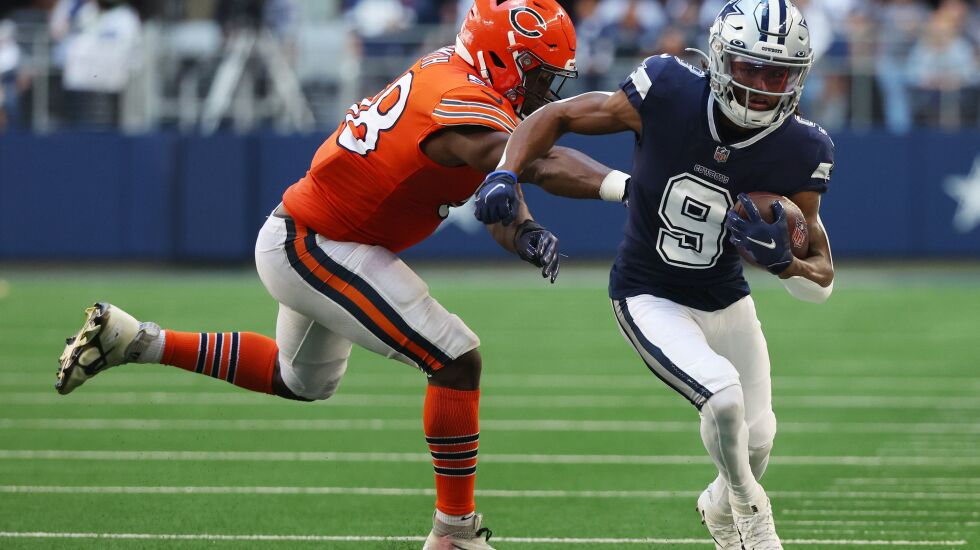
Bears defensive coordinator Alan Williams disputed the notion that an emotional letdown after the trade of defensive end Robert Quinn was the root of the collapse in last week’s 49-29 loss to the Cowboys. The Bears’ defense allowed 42 of those points.
“No. No,” Williams said. “People have asked me that before, and I would say you have to give some credit to Dallas. They are a really good team, so they get their fair share of credit.”
Sure, but 42 points? The Cowboys’ fair share of credit would be about 24 points, the amount they scored with quarterback Dak Prescott against the Lions the previous week. The other 18 points are at least arguably on the Bears and the inevitable letdown after losing a team captain, mentor and leader in Quinn.
It’s probably not a coincidence that the player most affected by Quinn’s departure also had the biggest drop in performance. Linebacker Roquan Smith, who was so overcome with emotion when asked about Quinn being traded that he cut short a news conference last week, had his worst game of the season: five tackles and some uncharacteristic errors that led to big plays.
It’s also probably not a coincidence that a defense that had consistently played well in the second half put up minimum resistance this time. The Bears came in allowing 4.6 yards per play and 5.0 points per game in the second half. They allowed 7.1 yards and 14 points on defense in the second half against the Cowboys.
“It’s one of those things where you look up and say, ‘What’s going on?’ ” linebacker Nicholas Morrow said. “Very uncharacteristic of how we’ve played throughout the season, especially in the second half. So you look at that and say, ‘That’s not us. That’s not how we’ve been playing all season.’ ”
Be that as it may, the defense has an even bigger challenge Sunday against the Dolphins: rebounding from the Cowboys debacle five days after taking an even bigger hit when Smith was traded to the Ravens.
Quinn was a respected leader, but Smith was a vocal leader who elicited emotion with emotion.
“Kind of the lifeblood of the locker room,” tight end Cole Kmet said.
Said Morrow: “He’s one of those guys that’s hard to replace beads of the energy he brings, not only on the field but in the facility. He made a point to get to know everybody in the building. You definitely feel his absence.”
So, now what? Even if the Bears can weather the emotional fallout of Smith’s departure, the defense still has a huge hole to fill.
“I looked at Roquan’s stats, and I was like, ‘Oh, my goodness,’ ” Morrow said. “It’s hard to replace that production he had for 4½ years and what he did in eight games this year. And I won’t sit here and say that it is. But at the same time, it’s a team game, so other guys have to step up and make plays. You have to find a way to play together.”
Therein lies the real hope — that the Bears’ defense can grow without its best player. When coach Matt Eberflus installed this defense with the Colts in 2018, it noticeably improved in the second half of the season, from 18th in points allowed (23.8 per game) to second (15.5), and from 21st in yards allowed (371.4) to seventh (308.0).
“The focus is execution — be where you’re supposed to be,” Williams said. “Alignment, assignment, key and technique. There are several big plays we’ve made where guys were just where they were supposed to be and . . . in the spot to make the play. If we do that at a high rate, we’ll be just fine.”
To Williams, it’s not just surviving the losses of Quinn and Smith but thriving. He believes the defense can still be better without them.
“I think so,” he said. “Yes. We will. [It’s] not ‘Can we?’ We will.”







